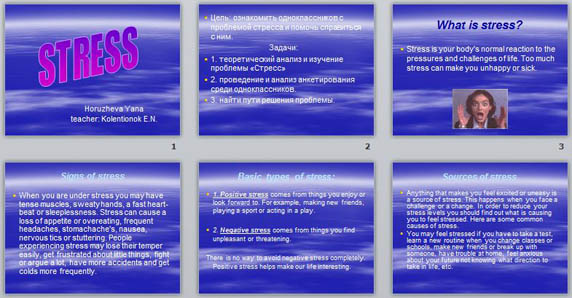Цель:
ознакомить одноклассников с проблемой стресса и помочь справиться с ним.
Задачи:
1. Теоретический анализ и изучение проблемы «Стресс».
2. Проведение и анализ анкетирования среди одноклассников.
3. Найти пути решения проблемы
What is stress?
Stress is your body's normal reaction to the pressures and challenges of life. Too much stress can make you unhappy or sick.
Signs of stress.
When you are under stress you may have tense muscles, sweaty hands, a fast heartbeat or sleeplessness. Stress can cause a loss of appetite or overeating, frequent headaches, stomachache's, nausea, nervous tics or stuttering. People experiencing stress may lose their temper easily, get frustrated about little things, fight or argue a lot, have more accidents and get colds more frequently.
Basic types of stress:
1. Positive stress comes from things you enjoy or look forward to. For example, making new friends, playing a sport or acting in a play.
2. Negative stress comes from things you find unpleasant or threatening.
There is no way to avoid negative stress completely. Positive stress helps make our life interesting.

Sources of stress.
Anything that makes you feel excited or uneasy is a source of stress. This happens when you face a challenge or a change. In order to reduce your stress levels you should find out what is causing you to feel stressed. Here are some common causes of stress.
You may feel stressed if you have to take a test, learn a new routine when you change classes or schools, make new friends or break up with someone, have trouble at home, feel anxious about your future not knowing what direction to take in life, etc.
How well you deal with stress?
1. Do you often feel overwhelmed by schoolwork or problems?
2. Do you often lay awake at night worrying?
3. Have you lost interest in things you once enjoyed?
4. Are you spending a lot more time alone, than you used to?
5. do you seem to get sick more than you used to?
6. Do you often wake up in the morning feeling tired?
7. Do you have trouble concentrating?
8. Do you feel like you need more time to do all the things you want to do?
9. Are you having a hard time getting alone with people?
10. Is your mood affected by little things?
11. Do you often feel you just want the world to go away?
If you answered "yes" to any of these questions, you may need help dealing with stress.
Some advice for reducing stress.
1. Think about what makes you feel stressed.
Avoid these things when you can.
2. See problems for what they are.
Do not let your reaction to a problem confuse the situation.
Focus on the problem and think about how to solve it.
3. Make up your own mind.
Do not let others push you into doing something that is not right for you.
When you make up your own mind, you will feel better about yourself, and less "stressed out".
4. Set goals that you can attain.
Ask yourself if there are some things you do not need to do.
5. Be a positive thinker.
Keeping a positive attitude can reduce your stress level.
When you look beyond your problems, you will see that the world is full of opportunities.
6. Learn to plan your time.
Create an action plan to handle a worrying challenge. List what you have to do. Set priorities. Focus on one task at a time.
Divide the task into parts you can manage. A one-step-at-a-time approach divides and conquers anxiety.
7. Prepare for stressful events.
Being well prepared for a test, for example, will strengthen your confidence and help you stay calm on the day of the test.
8. Do not be afraid to fail.
Mistakes are an important part of personal growth. Learning from failures allows you to go on to greater success!
9. Analyse how you explain failure.
Do you blame yourself? Laying blame and taking responsibilities are two different things. Pessimists blame themselves; optimists don not. Do not say, "I failed because I am stupid or incompetent." Do say," I failed because the test covered material I didn't focus on when studying." In the latter situation you are in control of changing things for the better.
Заключение.
Стресс – это неизбежность, о которой мы должны знать и всегда помнить.
Стресс можно предвидеть. Нужно обязательно подготовиться к его приходу и постараться справиться с ним как можно лучше.
Некоторых стрессов можно избежать вообще.
Нельзя допускать победы стресса над собой. Надо терпеливо, с желанием готовить себя к сложным жизненным ситуациям, которые обязательно нам встретятся и на работе и в личной жизни.

 Получите свидетельство
Получите свидетельство Вход
Вход
























 Конспект урока и презентация по английскому языку "Stress" (0.22 MB)
Конспект урока и презентация по английскому языку "Stress" (0.22 MB)
 0
0 3405
3405 514
514 Нравится
0
Нравится
0


